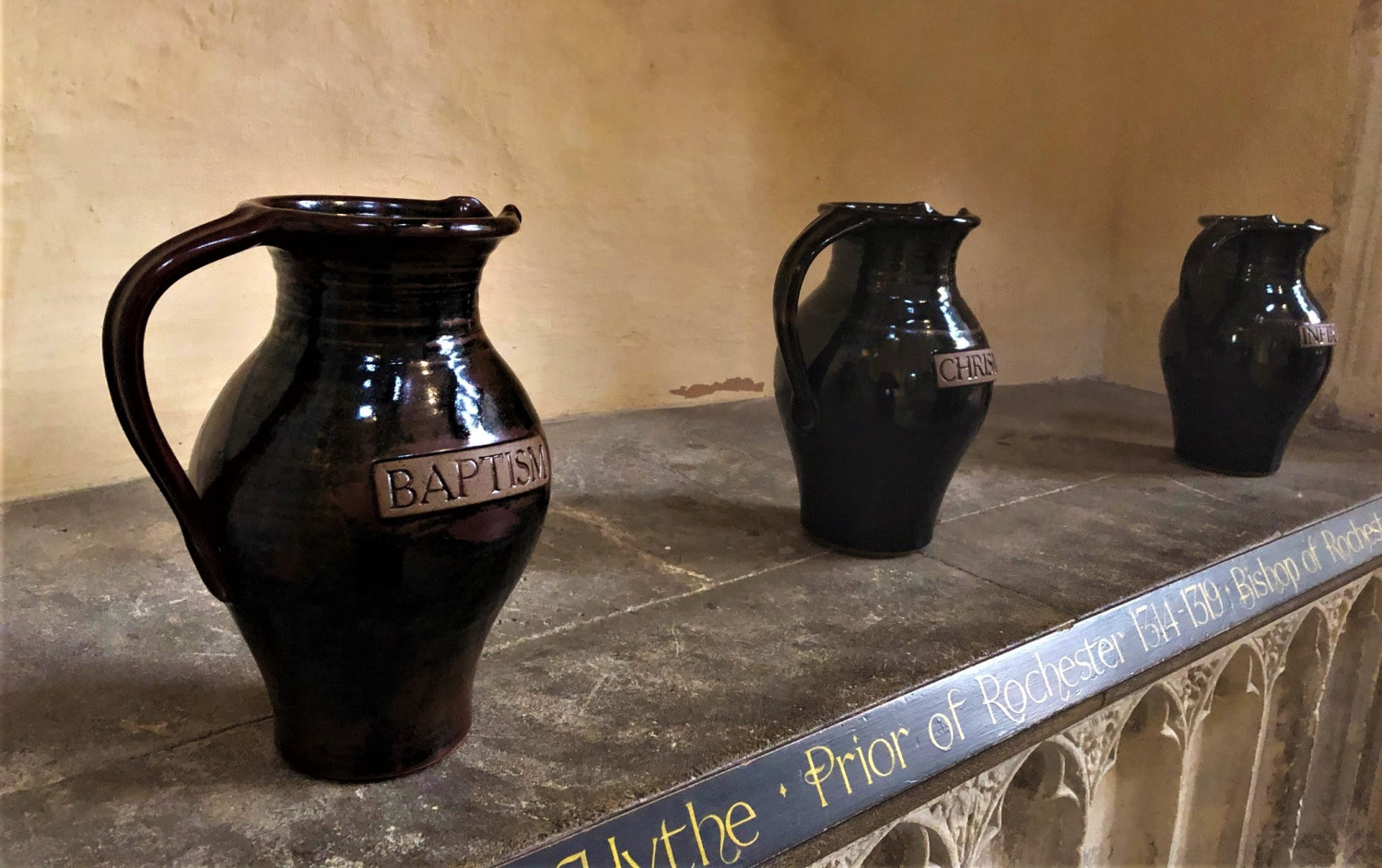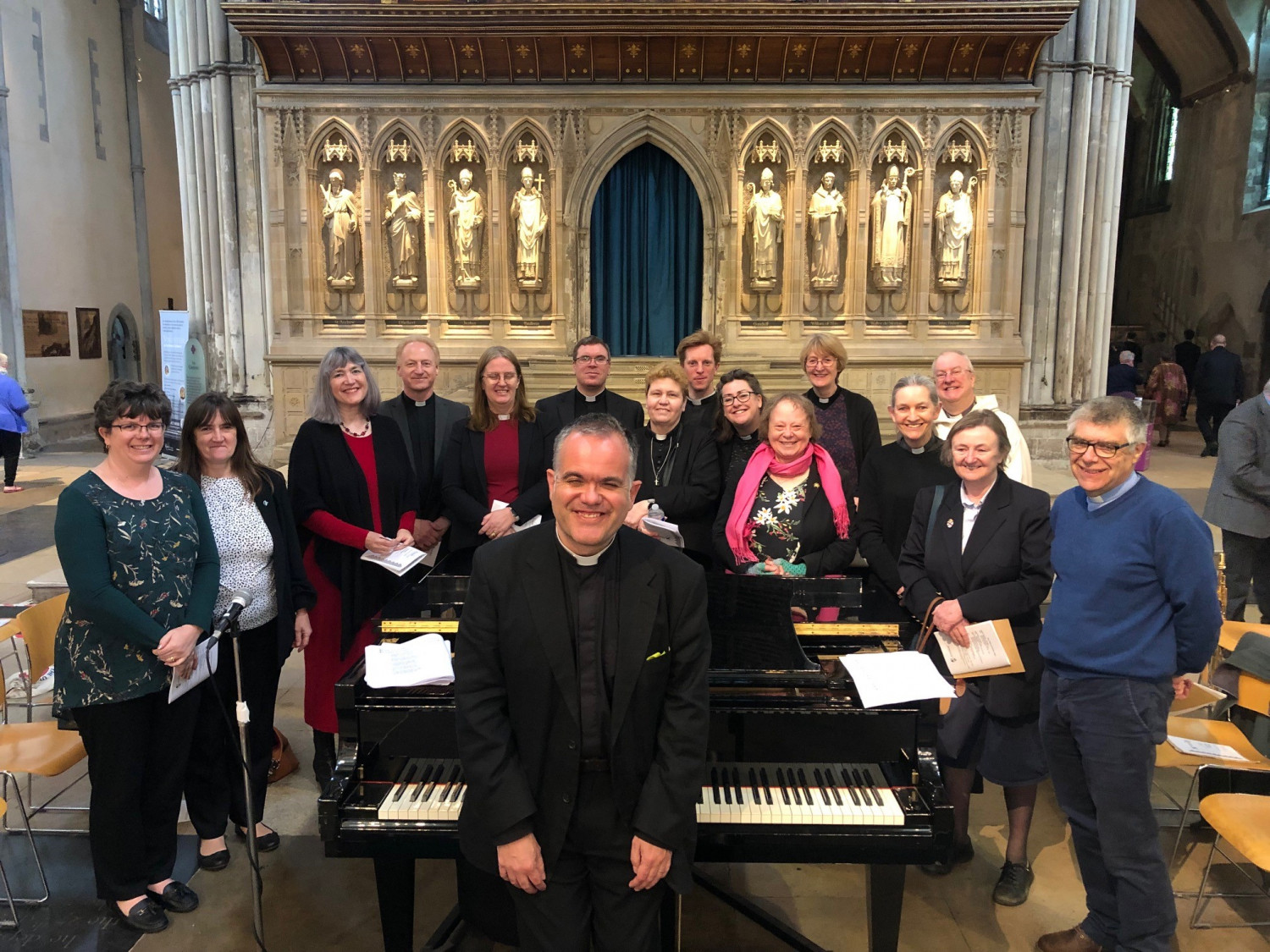
Ordained and lay members of the Diocesan family gathered at Rochester Cathedral for the Chrism Eucharist - the first Chrism Service to be held in the Cathedral since 2019, due to the pandemic.
Taking place on Maundy Thursday, the service is an opportunity for those present to renew their commitment to ministry in the presence of God and one another.
Maundy Thursday is the day when Christians traditionally remember Jesus sharing the Last Supper with his disciples before his death on Good Friday, and his command to, "Love one another as I have loved you."
During the service, the sacramental oils used during the life of Church - the oil for the anointing of the sick and dying, the oil used at baptism, and the oil of chrism - were blessed. A musical ensemble made up of ordained and lay ministers, and church officers from across the area of the Diocese led the music.

Speaking at the Chrism Service, Bishop Simon spoke about the value of servant leadership. Read his address in full below or download a copy
Maundy Thursday
Jesus said to the mob sent to arrest him: this is your hour and the power of darkness. When you live in a country at peace, it is hard to grasp what the rule of darkness feels like. The taste, touch and smell of evil.
Anthony Loyd, the distinguished Times war correspondent, currently reporting from Ukraine, wrote this of his encounter with a Serbian killing field in Bosnia:
And there was something more than what you saw, smelled and felt…the atmosphere. It chain-sawed through your senses…For whatever had been sucked out of that place, something else had been pumped in…Some empty black infinity…that spat and laughed.
This was the air that surrounded Jesus and his friends that last Passover.
Maundy Thursday stands as a warning against hubris in following Christ. Only when the hour of darkness descends can we be sure of the strength of our commitment. That is why a wise response to the last hours of Jesus is one of silence and humility, and prayer for people in this world enveloped by the darkness Anthony Loyd felt in Bosnia.
Amid the gathering evil, Jesus set about his final acts of teaching, and they were dominated more by images than words. Symbolic acts have the power to reach people in a way words cannot. I doubt you will remember many of the sayings of Nelson Mandela. But you will remember his pulling on of a Springbok rugby shirt in Johannesburg in 1995 to signify a newly united nation.
If there is a modern equivalent to foot washing on a parched and dusty day, it could be cleaning the men’s toilets in a motorway service station on a hot day. If the God who made the stars whose brightness takes millions of years to reach us can stoop to this kind of work, our culture may need a radical re-think on status.
Servant leadership is almost an oxymoron now – two words that can’t belong together because they describe people at different ends of the social scale. We appreciate service when it is offered – the last two years have shone a welcome light on that. But there is an unspoken, prevailing sense in public life that service is somehow offered by those who haven’t quite made it in life to those who have. This self-serving lie allows a culture where people offering service are paid little and are believed to do their job better when no-one notices them. Unless the service is found wanting, in which case the worker can be treated like a species somewhere between a human and an animal.
Your ministry takes place daily on a spiritual front line. As this front line is not recognised by all in a secular culture, it can place you in the double jeopardy of offering a service which isn’t even properly recognised as service. And there are things that we should name. People feel tired and underappreciated and hemmed in by expectations that veer from the trivial to the impossible. There are morale sapping arguments over what kind of Church we should be. And routine sniping in print and online media about the failings of its leaders. There are metrics that cling to us like shadows: the modern fetish for data that cannot quite measure how the kingdom of God draws near but which still manages to condemn you by numbers.
Surrounded by accusation, the next step is always the act of service. This was the conscious choice of Jesus in the hour of darkness. He could have been distracted by the evil forming around him. He was fully human, and might have been assailed by a very human sense that all he had achieved would come to nothing, especially if he made any missteps in the sleep-deprived, pain filled night ahead of him. Or by a thought that the large crowds that once surrounded him – a great metric to pass on to any number crunchers – would melt away, leaving only a small cohort of disheartened followers to reminisce about the glory years.
We cannot fully know his mind, but Gethsemane shows he was nauseous, daunted and deeply alone among people.
We are presenting different emotions here today. However well we may feel, the legacy of these two years has infected us with a peculiar numbness. Covid has removed a sense of taste and smell from many people, but it has also dulled our relationships by depriving us of tangible, tactile, joy-filled contact. Like a day where the fog does not lift, making it damp, chilly and subdued.
Whatever you may feel today on a scale that ranges from peace and joy to boredom and flatness to anxiety and fear, Jesus wishes to minister to you. It will be different for each of us and not always what we might expect. We may also be resistant, like Peter initially. It is noticeable how ministers who preach the everlasting love of God can be so reluctant to receive that love, approaching God like an employee at a rocky annual appraisal rather than a child in whom the parent is utterly overjoyed. Perhaps it says something about the dearth of encouragement in the Church and the wider culture that we are tempted to think this about God as well.
Jesus reached out to wash the part of body that would have hurt the most, throbbing, itching, possibly bleeding, with the effect of walking on hot, infested, unmade walkways. It was the part of them that suffered the greatest impact from following Jesus on the way, from being obedient to his lead. I wonder what part of you that would be; that you have taken the biggest hit from in your ministry? For this is the part of you that Jesus wants to wash clean and heal; to restore and revitalise today.
Come to me, all you who are weary and are carrying heavy burdens, and I will give you rest.
For many of us, it lies in the matrix of fear, anxiety and the sense of failure that swirls about us. There is nothing in our self-judgment that has not been forgiven and liberated by the power of the cross. This may be the washing some of us need from Jesus today.
There are many who long for someone to care for them, to feel the love of God in the person standing in front of them, or kneeling by their feet. We’ve got it all wrong about service in today’s world. We have tipped God’s way on its head and he is tipping it back. To serve may feel unglamorous, unflattering and inconsequential, but it is how the kingdom of God draws near; and is the glory of the world to come.
In a culture overwhelmed with dishonest words, it is the healing we offer in Christ to other people that distinguishes the truth from the lie. And on the threshold between the old world and the new creation stands a cross we must embrace first before we demonstrate it to others, in its redeeming of human failure and its healing of human fear.
The next step is always the act of service.
Simon, Bishop of Tonbridge